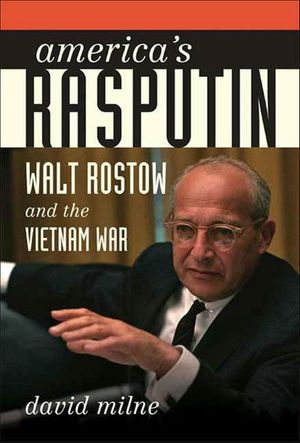America's Rasputin
Published by Farrar, Straus and Giroux
David Milne's America's Rasputin provides the first major study of the man who pushed two presidents into Vietnam.
Walt Rostow's meteoric rise to power—from Flatbush, Brooklyn, to the West Wing of the White House—seemed to capture the promise of the American dream. Hailing from humble origins, Rostow became an intellectual powerhouse: a professor of economic history at MIT and an influential foreign policy adviser to John F. Kennedy and Lyndon B. Johnson.
Too influential, according to some. While Rostow inspired respect and affection, he also made some powerful enemies. Averell Harriman, one of America's most celebrated diplomats, described Rostow as "America's Rasputin" for the unsavory influence he exerted on presidential decision-making. Rostow was the first to advise Kennedy to send U.S. combat troops to South Vietnam and the first to recommend the bombing of North Vietnam. He framed a policy of military escalation, championed recklessly optimistic reporting, and then advised LBJ against pursuing a compromise peace with North Vietnam.
David Milne examines one man's impact on the United States' worst-ever military defeat. It is a portrait of good intentions and fatal misjudgments. A true ideologue, Rostow believed that it is beholden upon the United States to democratize other nations and do "good," no matter what the cost. America's Rasputin explores the consequences of this idealistic but unyielding dogma.
BUY NOW FROM
COMMUNITY REVIEWS

